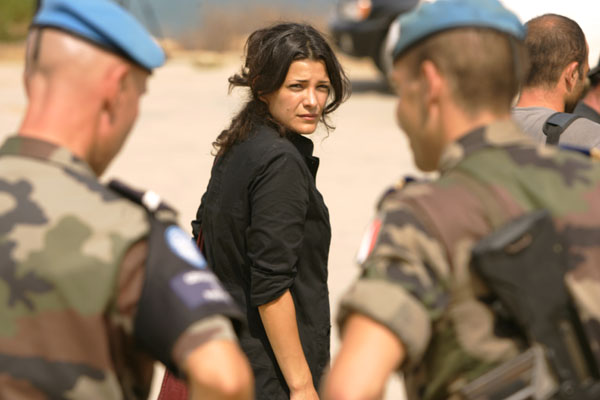|
Reviews of Recent Independent, Foreign, & Documentary Films in Theaters and DVD/Home Video

UNDER THE BOMBS Under the Bombs is one of those rare films successfully created in the moment to capture extraordinary circumstances. The opening scene was filmed while bombs were still falling on Lebanon in the summer of 2006. The story that Franco-Lebanese director Philippe Aractingi structured with writer Michel Léviant following the fragile ceasefire recalls Fred Zinnemann’s classic The Search through shattered post-war Germany. Whereas an orphan searches for his mother in that earlier film, here a frantic mother, Zeina (Nada Abou Farhat), desperately seeks a taxi cab to take her from Beirut to her home village in the south, near the front of the Israeli invasion, to find her six-year-old son and her sister. All the drivers only offer to drive to Damascus. They warn the road south is blocked, but it could also be that they’re leery—Zeina’s wearing a tight-fitting, bright blue, low-cut dress. Only one driver steps forward to take her south to Tyre, Tony (Georges Khabbaz), and only after some financial negotiation. Their experiences on the road were partly improvised, as in the quasi-documentary style of Haskell Wexler’s Medium Cool, to incorporate the people they meet and the ravaged landscape they pass—town after town reduced to rubble; assembly-line coffin burials in freshly dug cemeteries; pro-Hezbollah demonstrations and banners; and the second invasion by aid suppliers, foreign journalists, and peacekeepers. Even with the searing immediacy of this back drop, the two people in the forefront on the broken road are genuine, rounded individuals with a growing empathetic connection as they gradually reveal their complicated lives and regrets to each other. Zeina hurriedly buys a conservative outfit to fit in where she grew up, and her arguments via cell phone with her architect husband lead to admissions about her life in Dubai and her guilt over sending her son home to Lebanon. Tony confesses his turmoil as a Christian whose brother joined the pro-Israeli South Lebanese Army. Everywhere
they go are signs of a country torn apart by religion, politics and war,
but there are no Hollywood miracles. When Zeina wails “Do we have a
right to live?” she is expressing less a political statement than a
caption for the film’s powerful visual images of the civilian cost of
war. Nora Lee Mandel
|

